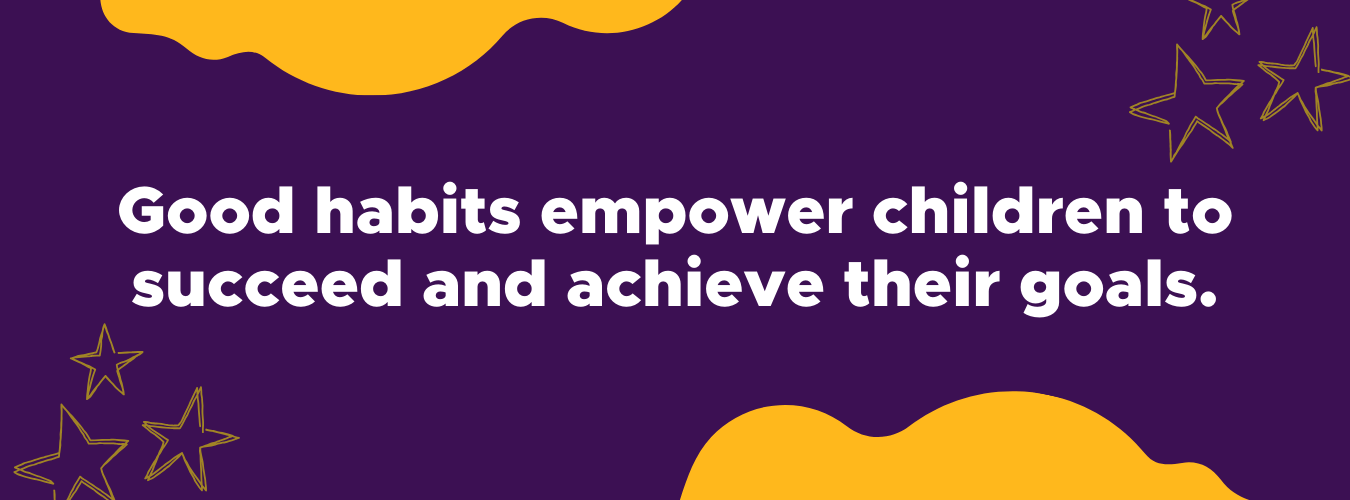Daily Habits for Children

"Imagine a life where success flows effortlessly, where your every action aligns with your aspirations. The secret? It's all in your habits.
Now, think about the children in your life. How can we empower them for a future brimming with achievement and fulfilment?
Establishing a strong foundation for success relies heavily on our daily routines and behaviours. The choices we make across different facets of our lives not only reflect our character but also mould the overall quality of our lives. Guiding children to embrace healthy habits is a fundamental stride in equipping them for a prosperous future.
Is your child struggling to keep up with schoolwork? Are they falling behind? Are they bored in class? Or are you looking for extension work for your child? Check out our eBook to learn more about how we help your child improve academically and build confidence through our in-centre after-school tuition.
These habits truly take root when children comprehend the significance of good daily habits and recognise the broader motivation driving choices that align with their aspirations. The important role of teaching and exemplifying these wholesome habits cannot be understated in paving the way for a successful future for our children. In this blog, we will explore effective techniques to help your children cultivate these invaluable habits.
1. Define Goals and Grasp Good Habits
Positive habits serve as the catalyst for unlocking a child's potential and setting them on the path to success. When introducing a new habit to your child, it's crucial to help them fully comprehend the benefits they offer. To begin, delve into your child's dreams and objectives, whether they're aiming for academic excellence like earning the Top in Class award, advancing in after-school tutoring, or auditioning for the orchestra.
Regardless of their specific goal, ensure it stands vividly in their mind, fostering a deep understanding of what they're striving to achieve. This clarity not only aids in establishing habits but also fuels their motivation to consistently study or practice, propelling them closer to their coveted accomplishments.

2. Utilise Habit Stacks
Habit stacks are a dynamic tool in the journey of habit formation. They offer an excellent approach to introducing a sequence of positive habits to children.
For instance, constructing a student's habit stack could encompass a range of seemingly small actions: packing their school bag, arranging their uniform, engaging in personal hygiene, reading a set number of pages, and adhering to a consistent bedtime.
This new stack of habits effectively equips children for the day ahead and can be seamlessly incorporated into various segments of their routine. With time and deliberate practice, these good habit-building stacks morph small changes into powerful mechanisms that keep children on track, enabling them to progress to their aspirations.

3. Foster Healthy Habits
The introduction of reminders can be a game-changer when it comes to instilling new habits. These reminders serve as prompts that stimulate the conscious thought process required for initiating desired actions.
To steer clear of the pitfalls of nagging, consider things like employing reminders, alarms or visual cues instead. Visual aids such as charts strategically placed on the refrigerator or in the bathroom act as effective prompts, facilitating children in remembering their tasks.
4. Design a Consistent Routine
Constructing a routine around habits enhances memory retention and consistency. A morning routine, for instance, could include an array of tasks, such as getting dressed, having a nutritious breakfast, brushing teeth, and organising belongings.
To enhance this experience, integrating visual timetables with relevant images fosters engagement, focus and clarity. By engaging in this routine collectively, children’s understanding is reinforced.
5. Embrace Positive Reinforcement
The art of rewarding positive behaviours with meaningful incentives forms a critical pillar in the establishment of healthy habits. Whether it's with praise, high-fives, or granting extra outdoor playtime, these commendable rewards strengthen the foundation of good habits.
Often, the habit tracker itself evolves into a self-sustaining reward mechanism. For instance, as a child progresses in the art of playing the piano, the instant gratification and innate satisfaction that accompanies improvement becomes intrinsically motivating.
Integrating a reward system that is linked to the habit tracker fosters accountability, and a sense of independence, and improves focus and consistency.

6. Allocate Dedicated Study and Learning Time
Cultivating the habit of allocating specific time for homework or study is the cornerstone for effective time management. This practice extends to university and professional domains as well when your children are older.
7. Cultivate Holistic Well-Being
A daily routine that prioritises healthy eating, sufficient sleep, and regular exercise has countless benefits for students navigating various stages of their academic journey.
By embedding practices like consuming a balanced breakfast, incorporating exercise into daily routines, and carving out time every day for social interactions, parents create a holistic approach to their children's well-being.

8. Reflect and Ignite Enthusiasm
Encouraging children to dedicate a few hours each day for reflection, where they acknowledge their achievements, reflect on their newfound knowledge, and visualise their future goals, ignites enthusiasm.

Celebrate Your Child's Success with NumberWorks'nWords
At NumberWorks'nWords, our mission transcends academic excellence; we also endeavour to nurture positive learning behaviours and good habits. Our nurturing environment, guided by expert tutors who epitomise positive behaviour, helps to build habits and empower children to not only excel academically but also thrive beyond the classroom.
To gain g more insights into our math and English tutoring programmes, reach out to your local centre and secure a free assessment. Our ongoing interactions with parents unlock a treasure trove of practical advice and strategic insights, enabling children to harness success within the classroom and beyond.




